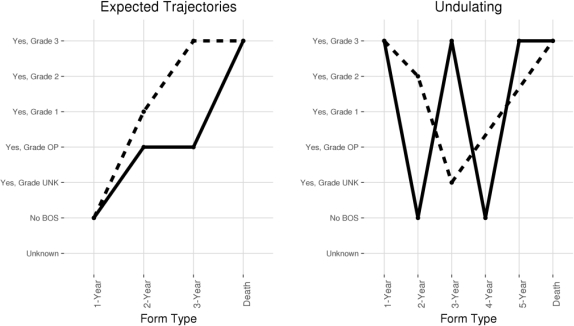Reliability of Bronchiolitis Obliterans Syndrome Reporting to the OPTN
1United Network for Organ Sharing, Richmond
2Univ of Michigan, Ann Arbor
3Medical Univ of South Carolina, Charleston.
Meeting: 2018 American Transplant Congress
Abstract number: C249
Keywords: Lung, Lung transplantation, Outcome, Rejection
Session Information
Session Name: Poster Session C: Lung: All Topics
Session Type: Poster Session
Date: Monday, June 4, 2018
Session Time: 6:00pm-7:00pm
 Presentation Time: 6:00pm-7:00pm
Presentation Time: 6:00pm-7:00pm
Location: Hall 4EF
Background: Chronic rejection of the lung allograft is traditionally classified as bronchiolitis obliterans syndrome (BOS) diagnosed by obstructive airway physiology. The OPTN requires the reporting of BOS stage (0p to 3) on the Lung Transplant Recipient Follow-up Form (TRF).
Methods: The distribution of responses and individual trajectories of the BOS field on the OPTN TRF for adult lung alone transplant recipients between 2009 and 2015 were studied. Options on the TRF for BOS are “Unknown”, “No” or “Yes” with grades of “OP”, “1”, “2”, “3” or unknown.
Results: 3,678 (30.9%) out of 11,889 lung transplants in the US reported a positive BOS status after transplant. Out of the 3,678 transplants that indicated positive BOS, 1,274 (34.6%) recipients reported at some follow-up that their BOS severity was less than the previous evaluation. Of the 873 recipients with a maximum BOS grade 3 ever reported, 199 (22.8%) reported at least one decrease in severity during their post-transplant follow-up. Only 6.3% of forms are recorded with unknown BOS status. Recipients are reported with No BOS 75.4% of the time (88.3% at 1-yr and 64% at 5-yrs) but only 30.6% at graft failure. Examples of patient trajectories displaying expected increasing trajectories as well as uncertain undulating patterns are shown in the figure.
Conclusions: This evidence supports that BOS criteria on the lung TRF does not always represent the progression of chronic rejection. Trends indicate that reporting is not consistent within each center or patient. Patients with reported maximal values of BOS are declared to have their conditions improve over time without objective evidence to understand the etiology. Discrete objective fields such as pulmonary function test results may better allow detection of chronic lung allograft dysfunction (CLAD) – a concept currently under exploration by the OPTN Thoracic Organ Transplantation Committee.
CITATION INFORMATION: Carrico R., Lehman R., Uccellini K., Chan K., Whelan T. Reliability of Bronchiolitis Obliterans Syndrome Reporting to the OPTN Am J Transplant. 2017;17 (suppl 3).
To cite this abstract in AMA style:
Carrico R, Lehman R, Uccellini K, Chan K, Whelan T. Reliability of Bronchiolitis Obliterans Syndrome Reporting to the OPTN [abstract]. https://atcmeetingabstracts.com/abstract/reliability-of-bronchiolitis-obliterans-syndrome-reporting-to-the-optn/. Accessed February 14, 2026.« Back to 2018 American Transplant Congress

